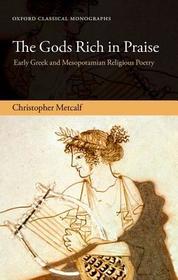
The Gods Rich in Praise
Early Greek and Mesopotamian Religious Poetry
Series: Oxford Classical Monographs;
- Publisher's listprice GBP 122.50
-
58 524 Ft (55 737 Ft + 5% VAT)
The price is estimated because at the time of ordering we do not know what conversion rates will apply to HUF / product currency when the book arrives. In case HUF is weaker, the price increases slightly, in case HUF is stronger, the price goes lower slightly.
- Discount 10% (cc. 5 852 Ft off)
- Discounted price 52 671 Ft (50 163 Ft + 5% VAT)
Subcribe now and take benefit of a favourable price.
Subscribe
58 524 Ft

Availability
printed on demand
Why don't you give exact delivery time?
Delivery time is estimated on our previous experiences. We give estimations only, because we order from outside Hungary, and the delivery time mainly depends on how quickly the publisher supplies the book. Faster or slower deliveries both happen, but we do our best to supply as quickly as possible.
Product details:
- Publisher OUP Oxford
- Date of Publication 30 April 2015
- ISBN 9780198723363
- Binding Hardback
- No. of pages304 pages
- Size 219x156x23 mm
- Weight 490 g
- Language English 0
Categories
Short description:
This volume examines the question of whether early Greek poetry was inspired by texts from the neighbouring civilizations of the ancient Near East, especially Mesopotamia.
MoreLong description:
Many scholars today believe that early Greek literature, as represented by the great poems of Homer and Hesiod, was to some extent inspired by texts from the neighbouring civilizations of the ancient Near East, especially Mesopotamia. It is true that, in the case of religious poetry, early Greek poets sang about their gods in ways that resemble those of Sumerian or Akkadian hymns from Mesopotamia, but does this mean that the latter influenced the former, and if so, how? This volume is the first to attempt an answer to these questions by undertaking a detailed study of the ancient texts in their original languages, from Sumerian poetry in the 20th century BC to Greek sources from the times of Homer, Hesiod, Pindar, and Aeschylus.
The Gods Rich in Praise presents the core groups of sources from the ancient Near East, describing the main features of style and content of Sumerian and Akkadian religious poetry, and showing how certain compositions were translated and adapted beyond Mesopotamia. It proceeds by comparing selected elements of form and content: hymnic openings, negative predication, the birth of Aphrodite in the Theogony of Hesiod, and the origins and development of a phrase in Hittite prayers and the Iliad of Homer. The volume concludes that, in terms of form and style, early Greek religious poetry was probably not indebted to ancient Near Eastern models, but also argues that such influence may nevertheless be perceived in certain closely defined instances, particularly where supplementary evidence from other ancient sources is available, and where the extant sources permit a reconstruction of the process of translation and adaptation.
The Gods Rich in Praise sets a new standard for work on the relationship between Greek and Near Eastern literature, and will be a standard reference point for anyone who wants to do serious work in this area in future.
Table of Contents:
Acknowledgements
Abbreviations
Conventions
Introduction
Sumerian Hymns of the Old Babylonian Period
Akkadian Hymns of the Old Babylonian Period
The Hittite Evidence in the Light of the Old Babylonian Sources
Introductory Remarks on the Early Greek and Mesopotamian Sources
Hymnic Openings
A Case of Negative Predication
Variations on the Names of the Goddess
Sumerian and Hittite Notes on Iliad 1.62-4
Conclusion
Catalogue A: Old Babylonian Hymns
Catalogue B: Old Babylonian Akkadian Hymns
Catalogue C: Hittite Hymns
Catalogue D: Greek Hymns and Authors
References




